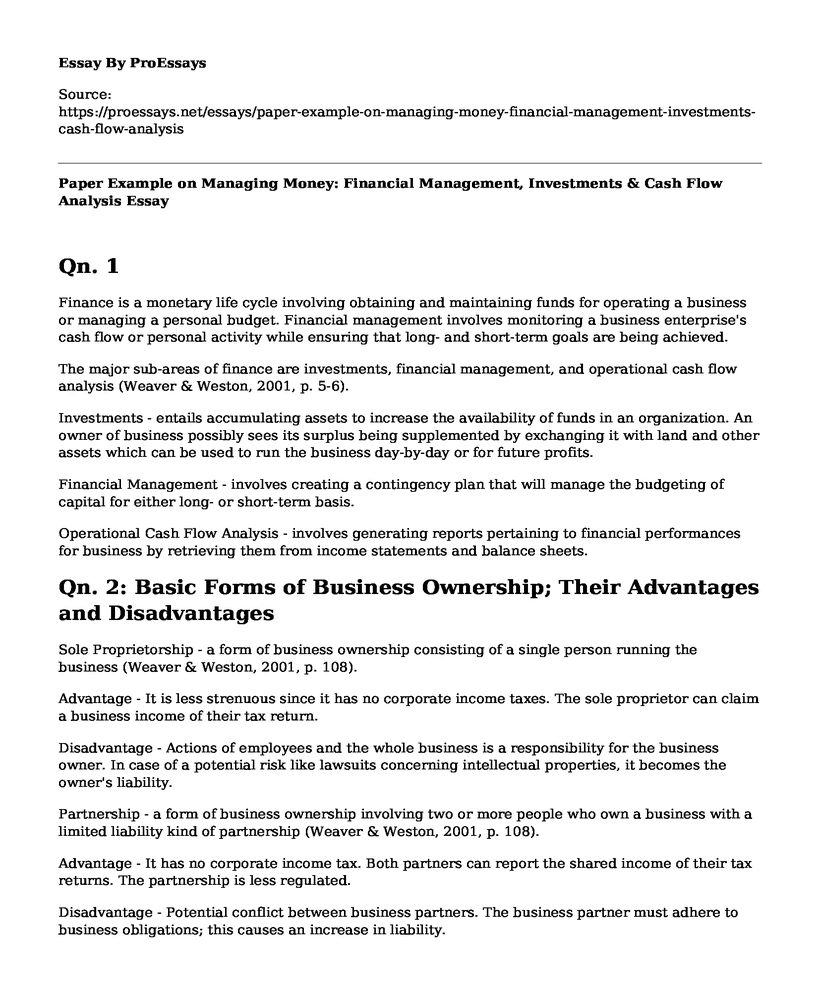Qn. 1
Finance is a monetary life cycle involving obtaining and maintaining funds for operating a business or managing a personal budget. Financial management involves monitoring a business enterprise's cash flow or personal activity while ensuring that long- and short-term goals are being achieved.
The major sub-areas of finance are investments, financial management, and operational cash flow analysis (Weaver & Weston, 2001, p. 5-6).
Investments - entails accumulating assets to increase the availability of funds in an organization. An owner of business possibly sees its surplus being supplemented by exchanging it with land and other assets which can be used to run the business day-by-day or for future profits.
Financial Management - involves creating a contingency plan that will manage the budgeting of capital for either long- or short-term basis.
Operational Cash Flow Analysis - involves generating reports pertaining to financial performances for business by retrieving them from income statements and balance sheets.
Qn. 2: Basic Forms of Business Ownership; Their Advantages and Disadvantages
Sole Proprietorship - a form of business ownership consisting of a single person running the business (Weaver & Weston, 2001, p. 108).
Advantage - It is less strenuous since it has no corporate income taxes. The sole proprietor can claim a business income of their tax return.
Disadvantage - Actions of employees and the whole business is a responsibility for the business owner. In case of a potential risk like lawsuits concerning intellectual properties, it becomes the owner's liability.
Partnership - a form of business ownership involving two or more people who own a business with a limited liability kind of partnership (Weaver & Weston, 2001, p. 108).
Advantage - It has no corporate income tax. Both partners can report the shared income of their tax returns. The partnership is less regulated.
Disadvantage - Potential conflict between business partners. The business partner must adhere to business obligations; this causes an increase in liability.
Corporation - a form of business ownership constituting a legal entity separated from its owners (Weaver & Weston, 2001, p. 9).
Advantage - Corporations can raise capital through the sale of company stock.
Disadvantage - There is a possibility of double taxation, and the government regulations are more stringent. Shareholders have to report dividends as personal income regardless of the income has already been taxed at the corporate level.
Qn. 3: Definition of Agency Relationship and Agency Problem; and Three Different Approaches Used for Minimizing the Agency Problem
An agency relationship is when an entity appoints a legal authority to act on its behalf as its agent. An agency problem is a difficulty arising from the failure of a principal who hires an agent fails to monitor the actions of the agent (Cornett, Adair & Nofsinger, 2016, p. 14).
Three approaches used for minimizing the agency problems are conflict mitigation, monitoring manager's actions, and offering the managers equity in the business to be owners (Sherman, 2011, p. 270).
Qn. 4: Why Ethical Behavior is So Important in the Field of Finance
The importance of ethical behavior in the financial field is that if things go badly where business protocols do not align with financial regulations, it could impact the company's reputation, especially when it comes to managing other people's money. Fraudulent activities not only damage a company's reputation, but they can dissuade consumers and investors from doing business with the company, and shareholders who are involved could face jail time.
Qn. 5: Concept of Shareholder Wealth Maximization; And If There Is Any Conflict Between Shareholders Wealth Maximization and The Financial Manager's Need to Act Ethically
Shareholder wealth maximization is a combination of wealth and maximization. Shareholder's wealth maximizes when the company's net worth maximizes. The conflict between the goal of a shareholder wealth maximization and the financial manager is very common because corporate governance audits can be intense for shareholders. Also, shareholders have the tendency to push for wealth maximization, not considering the cost, which puts their wealth at stake.
References
Cornett, M. M., Adair, T. A., & Nofsinger J. (2016). M: Finance (3rd ed.). New York, NY: McGraw-Hill, 14.
Sherman, E. H. (2011). Finance and accounting for nonfinancial managers (3rd ed.). New York, NY: American Management Association, 270.
Weaver, S. C., & Weston, J. F. (2001). Finance and accounting for nonfinancial managers. New York, NY: McGraw-Hill, 5-6, 108.
Cite this page
Paper Example on Managing Money: Financial Management, Investments & Cash Flow Analysis. (2023, Feb 23). Retrieved from https://proessays.net/essays/paper-example-on-managing-money-financial-management-investments-cash-flow-analysis
If you are the original author of this essay and no longer wish to have it published on the ProEssays website, please click below to request its removal:
- Group Development and Teamwork - Essay Example
- A Discussion on Servant Leadership Paper Example
- Essay Example on Evaluating Costing and Value Chain for Optimal Org Growth
- Team Charters: Roadmaps to Successful Progress - Essay Sample
- Research Paper on Leadership Crucial for Success in Construction Industry
- Essay Example on Premiums & Rates: Essential for Insuring Profit & Loss
- Essay Example on Katharine Graham: A Leader Embodying Self-Awareness and Relationships







